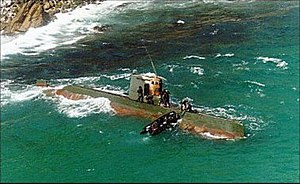Sang-O class submersible

Submarine involved in the 1996 incident as described.
|
|
| Class overview | |
|---|---|
| Builders: | Bong Dao Bo Shipyards, Singpo |
| Operators: |
|
| Preceded by: | Yugo class |
| Succeeded by: | Sinpo class |
| Subclasses: | attack version, infiltration/reconnaissance version |
| In commission: | 1991 |
| Completed: | 40+ |
| Active: | 40 (March 2011) |
| Lost: | 1 captured by South Korea |
| General characteristics (Sang-O I armed version) | |
| Type: | coastal submarine |
| Displacement: | 275 tons (surfaced), 370 tons (submerged) |
| Length: | 34m |
| Beam: | 3.8m |
| Propulsion: | Diesel-electric: 1 small diesel, 1 electric motor, 1 shaft |
| Speed: |
|
| Range: | 1,500 nautical miles (2,800 km) |
| Test depth: | 150 metres, capable of bottoming |
| Capacity: | 0 (10/11 in recce version) |
| Complement: | 15 crew |
| Sensors and processing systems: |
|
| Armament: | |
| Notes: | Fitted with a snorkel |
The Sang-O (Shark) class submarines (Hangul: 상어급 잠수함) are in use by North Korea, and are the country's largest indigenously-built submarines. A single unit was captured by the Republic of Korea Navy (South Korea) after it ran aground on 18 September 1996 in the 1996 Gangneung submarine infiltration incident.
It was widely reported in March 2011 that a new version of the Sang-O class had been deployed in North Korea. Satellite imagery from 2005 suggests the Sang-O II / K-300 may have been produced at the Mayang-do naval base and fitted out at the dry docks located at 39.9978 N, and 128.20019 E.
Other footage of the nearby docks of Sinp'o appear to depict the Sang-O II / K-300 as early as 2004 (at 40 01'31.20"N 128 09'55.80"E). Subsequent satellite imagery shows the Sang-O II / K-300 deployed to the Ch’aho-rodongjagu submarine Navy Base at 40.205441 N 128.649524 E on North Korea's east coast.
According to the KPA Journal, the decision to develop a larger, improved version of the Sang-O came in the late 1990s or early 2000. The Sang-O II / K-300 is a stretched version of the original Sang-O class with an approximate length of 39 to 40 metres and a corresponding surface displacement of approximately 300 to 340 tons.
The increased length and internal volume would suggest an increased in the operational range of the submarine and troop/equipment carrying capabilities. Top speed is also reported to be higher in the new model, meaning an improved propulsion system is likely using some of the extra length.
...
Wikipedia
